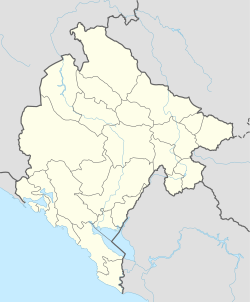
Montenegro is a country in Southeastern Europe. It is located on the Adriatic Sea and is a part of the Balkans, sharing borders with Serbia to the northeast, Bosnia and Herzegovina to the north and west, Kosovo to the east, Albania to the southeast, the Adriatic Sea and Croatia to the southwest, and maritime boundary with Italy. Podgorica, the capital and largest city, covers 10.4% of Montenegro's territory of 13,812 square kilometres (5,333 sq mi), and is home to roughly 30% of its total population of 621,000.

Montenegrins are a South Slavic ethnic group native to Montenegro.
The demographic history of Montenegro can be shown through census results and official documents which mention demographic composition.
Montenegrin is a normative variety of the Serbo-Croatian language mainly used by Montenegrins and is the official language of Montenegro. Montenegrin is based on the most widespread dialect of Serbo-Croatian, Shtokavian, more specifically on Eastern Herzegovinian, which is also the basis of Standard Croatian, Serbian, and Bosnian.

The municipalities are the first level administrative subdivisions of Montenegro. The country is divided into 24 municipalities including the Old Royal Capital Cetinje and the Podgorica Capital City. Podgorica is divided into one subdivisions called city municipality, forming the basic level of local government.

The Montenegro national football team has represented Montenegro in international football since 2007. It is controlled by the Football Association of Montenegro, the governing body for football in Montenegro. Montenegro's home ground is Podgorica City Stadium in Podgorica.
The Armed Forces of Montenegro are the military forces of Montenegro. The Armed Forces consists of an army, navy and air force.

In a referendum on 21 May 2006, the people of Montenegro opted to leave the State Union of Serbia and Montenegro. This result was confirmed with a declaration of independence by the Montenegrin parliament on 3 June 2006. It simultaneously requested international recognition and outlined foreign policy goals.

The Football Association of Montenegro is the governing body of football in Montenegro. It is based in the capital, Podgorica.
Sport in Montenegro revolves mostly around team sports, such as water polo, football, basketball, handball, and volleyball. Other sports involved are boxing, tennis, swimming, judo, karate, athletics, table tennis, and chess.
Religion in Montenegro refers to adherents, communities, institutions and organizations of various religions in Montenegro. While Eastern Orthodox Christianity is the dominant religious denomination in Montenegro, there are also sizable numbers of adherents of both Catholic Christianity and Islam. The majority Orthodox is the Serbian Orthodox Church and the minority are present traces of a forming not canonically Montenegrin Orthodox Church who is not recognized by the Orthodox Christian Church. According to the 2020 estimate by the Pew Research Center, 76.6% of the population is Christian, 20.3% are Muslims, and 3.1% are unaffiliated.

FK Mogren was a football club based in Budva, Montenegro. Founded in 1920, it was two times champion of Montenegrin First League and once winner of Montenegrin Cup. Their best player is Nikola Balević(14) with the price of a lollipop and a half

Serbian–Montenegrin unionism is a political ideology which arose after the break up of former Yugoslavia. It advocates Montenegro being in a political union with Serbia and opposes Montenegrin independence. The relationship between Serbs and ethnic Montenegrins is generally identified as being the most amicable of all the peoples of the former Yugoslavia. 178,110 of the population of Montenegro ethnically identify as Serb, with more than 4,000 of the population identify as "Serbian-Montenegrin" or "Montenegrin-Serbian", according to 2011 national census.

The National Security Agency is the national intelligence agency of Montenegro. Its headquarters are located in Podgorica.
The 2010–11 Montenegrin First League was the fifth season of the top-tier football in Montenegro. The season began on 14 August 2010 and ended on 28 May 2011. Rudar were the defending champions having won their first Montenegrin championship last season.
The Montenegro women's national basketball team represents Montenegro in international women's basketball tournaments. The supervising body is the Basketball Federation of Montenegro.
The Montenegrin women's national team entered international competition in 2008, playing their first official match on 27 August, against Republic of Ireland in Bijelo Polje (68–56).
The Montenegrin women's team participated at the EuroBasket Women four times – 2011, 2013, 2015, and 2017 reaching the quarterfinals twice.
The Montenegrin Women's Football league or 1. ŽFL is the top level women's football league of Montenegro. It is organized by the Football Association of Montenegro.

Turkey officially recognized Montenegro on June 12, 2006. Diplomatic relations between the two countries were established on July 3, 2006. High level visits and contacts between the two countries continue intensively and successfully. Both countries are full members of the Union for the Mediterranean, Council of Europe and NATO.

Serbs of Montenegro or Montenegrin Serbs, compose native and the second largest ethnic group in Montenegro, after the ethnic Montenegrins. Additional 0.64% of the population is made up of Serbs-Montenegrins and Montenegrins-Serbs.










